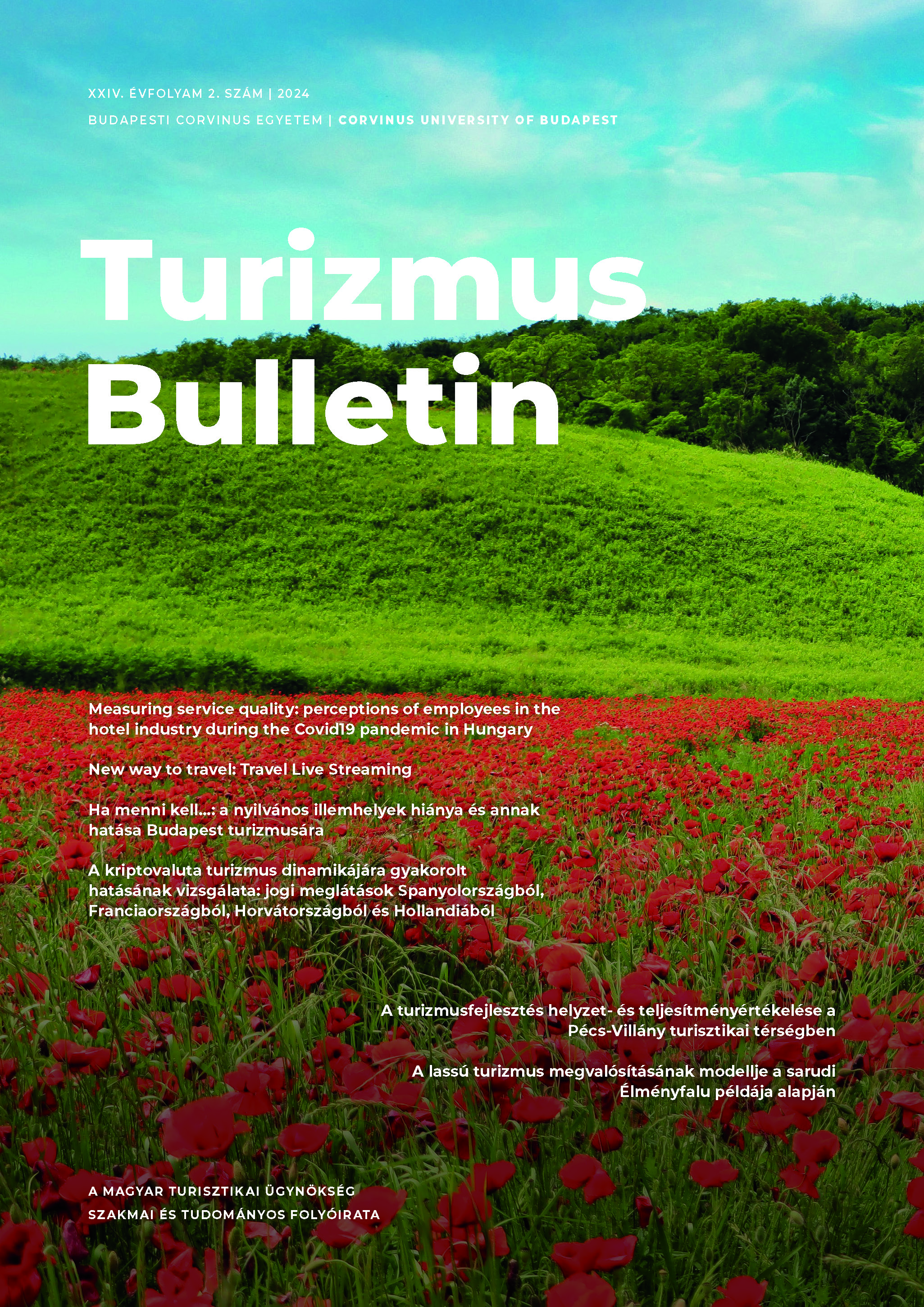Examining the impact of cryptocurrency on the dynamics of tourism: legal insights from Spain, France, Croatia and the Netherlands
DOI:
https://doi.org/10.14267/TURBULL.2024v24n2.4Keywords:
cryptocurrencies, tourism, legal regulation, blockchain technology, smart contractsAbstract
The research analyses the impact of cryptocurrencies on tourism and examines how digital currency regulations affect the dynamics of the tourism sector. The aim is to explore the use of cryptocurrencies in tourism and the impact of legal regulations in Spain, France, Croatia and the Netherlands. The research methodology involves the application of clustering neural networks and data analysis techniques such as SOM and PCA. The data collection was carried out by scraping method, thus providing a detailed insight into the cryptocurrency acceptance points in the countries under study. The results highlight the growing impact of blockchain technologies on tourism, with EU legislation having a significant impact on digital transactions. Cryptocurrencies and blockchain technologies are becoming increasingly important and are also governed by legislation. Further research into the relationship between tourism and digital technologies is important in the changing legal environment.
References
BALASUBRAMANIAN, S. – SETHI, J. S. – AJAYAN, S. – PARIS, C. M. (2022): An enabling Framework for Blockchain in Tourism. Information Technology & Tourism. 24. pp. 165–179. https://doi.org/10.1007/s40558- 022-00229-6
CAYAS, J. D. (2018): Regulation of Cryptocurrencies and Initial Coin Offerings in Switzerland: Declared Vision of a ‘Crypto Nation’. NYSBA International Law Practicum. 31(1). pp. 53–60.
CSORDÁS T. – IRIMIÁS A. – KISS K. (2022): Digitalizáció-vezérelt innovációk a turizmusban – fókuszban a fogyasztói magatartás. Turizmus Bulletin. 22(4). pp. 16–25. https://doi. org/10.14267/TURBULL.2022v22n4.2
ERCEG, A. – DAMOSKA SEKULOSKA, J. – KELIĆ, I. (2020): Blockchain in the Tourism Industry – A Review of the Situation in Croatia and Macedonia. Informatics. 7(1):5. https://doi. org/10.3390/informatics7010005
EROL, I. –NEUHOFER, I. O. – DOGRU, T. – OZTEL, A. – SEARCY, C. – YORULMAZ, A. C. (2022): Improving sustainability in the tourism industry through blockchain technology: Challenges and opportunities. Tourism Management. 93. 104628. https://doi. org/10.1016/j.tourman.2022.104628.
FOROUHID, A. E. – KHOSRAVI, S. – MAHMOUDI, J. (2023): Noise Pollution Analysis Using Geographic Information System, Agglomerative Hierarchical Clustering and Principal Component Analysis in Urban Sustainability (Case Study: Tehran). Sustainability. 15(3). 2112. DOI: 10.3390/su15032112
GANS, J. S. (2019): The fine print in smart contracts. NBER Working Paper Series. 25443.
HAPP É. – IVANCSÓNÉ HORVÁTH ZS. – KUPI M. (2020): Digitális eszközök és módszerek használatának marketingszempontú feltáró elemzése a magyar turisták körében. Turizmus Bulletin. 20(2). pp. 4–13. https://doi.org/10.14267/ TURBULL.2020v20n2.1
HUANG, F. – YANG, J. – ZHANG, B. – LI, Y. (2020): Regional terrain complexity assessment based on principal component analysis and geographic information system: a case of Jiangxi province, China. ISPRS International Journal of Geo-Information. 9(9). 539. DOI: 10.3390/ijgi9090539
KOO, C. – PARK, J. – LEE, J. N. (2017): Smart tourism: Traveller, business, and organizational perspectives. Information and Management. 54(6). pp. 683–686. https://doi.org/10.1016/j. im.2017.04.005
KWOK, A. O. J. – KOH, S. G. M. (2018): Is blockchain technology a watershed for tourism development? Current Issues In Tourism. pp. 1–6. https://www. researchgate.net/publication/327235014
NAM, K. – DUTT, C. S. – CHATHOTH, P. – KHAN, M. S. (2019): Blockchain technology for smart city and smart tourism: latest trends and challenges. Asia Pacific Journal of Tourism Research. 26(4). pp. 454–468. https://doi.org/10. 1080/10941665.2019.1585376
ÖNDER, I. − TREIBLMAIER, H. (2018): Blockchain and tourism: Three research propositions. Annals of Tourism Research. 72. pp. 180−182. https://doi.org/10.1016/j.annals.2018.03.005
PHILLIP, A. – CHAN, J. S. K. –PEIRIS, S. (2018): A new look at Cryptocurrencies. Economics Letters. 163. pp. 6–9. https://doi.org/10.1016/j. econlet.2017.11.020
PRADOS-CASTILLO, J. F. – MARTINEZ, J. M. G. – ZIELINSKA, A. – COMAS, D. G. (2023): A review of blockchain technology adoption in the tourism industry from a sustainability perspective. Journal of Theoretical and Applied Electronic Commerce Research. 18(2). pp. 814-830. https://doi.org/10.3390/jtaer18020042
SHEN, Y. – BAY, G. (2020): Research on Application of Blockchain in Internationalisation of China’s Medical Tourism Industry. 2020 International Signal Processing, Communications and Engineering Management Conference (ISPCEM). Montreal, QC, Canada. pp. 63–67. IEEE. https:// doi.org/10.1109/ISPCEM52197.2020.00018
STRIESSNIG, E. – BORA, J. K. (2020): Under five child growth and nutrition status: spatial clustering of Indian districts. Spatial Demography. 8. pp. 63–84. https://doi.org/10.1007/s40980- 020-00058-3 SZABO, N. (2020): Smart Contracts: Building Block for Digital Markets. Indira Ghandi National Open University.
THEES, H. – ERSCHBAMER, G. – PECHLANER, H. (2020): The application of blockchain in tourism: use cases in the tourism value system. European Journal of Tourism Research. 26. 2602. https://doi.org/10.54055/ejtr.v26i.1933
TYAN, I. – YAGÜE, M. I. – GUEVARA-PLAZA, A. (2020): Blockchain Technology for smart tourism destinations. Sustainability. 12(22). 9715. https://doi.org/10.3390/su12229715
VALERI, M. − BAGGIO, R. (2021): A critical reflection on the adoption of blockchain in tourism. Information Technology & Tourism. 21. pp. 121−132. https://doi.org/10.1007/s40558- 020-00183-1
Internetes források
DOGRU, T. – MODY, M. – LEONARDI, C. (2018): Blockchain Technology and its Implications for the Hospitality Industry. Boston Hospitality Review. https://www.bu.edu/bhr/ files/2018/02/Blockchain-Technology-and-its Implications-for-the-Hospitality-Industry.pdf Letöltve: 2023. október 6.
EUROPEAN COMMISSION (2023a): European Capital of Smart Tourism. https://smart-tourism capital.ec.europa.eu/about/european-capital smart-tourism_en Letöltve: 2023. október 14.
EUROPEAN COMMISSION (2023b): Smart cities. https://commission.europa.eu/eu-regional and-urban-development/topics/cities-and urban-development/city-initiatives/smart cities_en Letöltve: 2023. október 14.
EUROSTAT (2023a): Table: Nights spent at tourist accommodation establishments by NUTS 3 regions (from 2020 onwards). European Commission. https://ec.europa.eu/eurostat/databrowser/ view/tour_occ_nin3/default/table?lang=en Letöltve: 2023. október 13.
EUROSTAT (2023b): Table: Tourism Accommodation Establishments (TOUR_OCC_NINAT). European Commission. https://ec.europa.eu/eurostat/ databrowser/view/TOUR _OCC_NINAT/ default/table?lang=en Letöltve: 2023. október 13.
EUROSTAT (2022): Tourism statistics. https:// ec.europa.eu/eurostat/statistics-explained/ index.php?title=Tourism_statistics Letöltve: 2023. október 14.
NAKAMOTO, S. (2008): Bitcoin: A peer-to-peer electronic cash system. https://bitcoin.org/ bitcoin.pdf Letöltve: 2023. október 14.
SEC (Securities and Exchange Comission) (2024): Statement on the Approval of Spot Bitcoin Exchange Traded Products. January 10, 2024. https://www. sec.gov/news/statement/gensler-statement-spot bitcoin-011023 Letöltve: 2024. február 23.
UNEP (United Nations Environment Programme) (2005): Making tourism more sustainable – A guide for policy makers. UNEP-WTO. https://wedocs. unep.org/ Letöltve: 2023. október 6.
UNWTO (2023a): Tourism data and matching priorities: France. https://www.unwto.org/ europe/france Letöltve: 2023. október 14.
UNWTO (2023b): Tourism data and matching priorities: Spain. https://www.unwto.org/ europe/spain Letöltve: 2023. október 14.
UNWTO (2023c): Tourism data and matching priorities: The Netherlands. https://www.unwto.org/ europe/netherlands Letöltve: 2023. október 14

